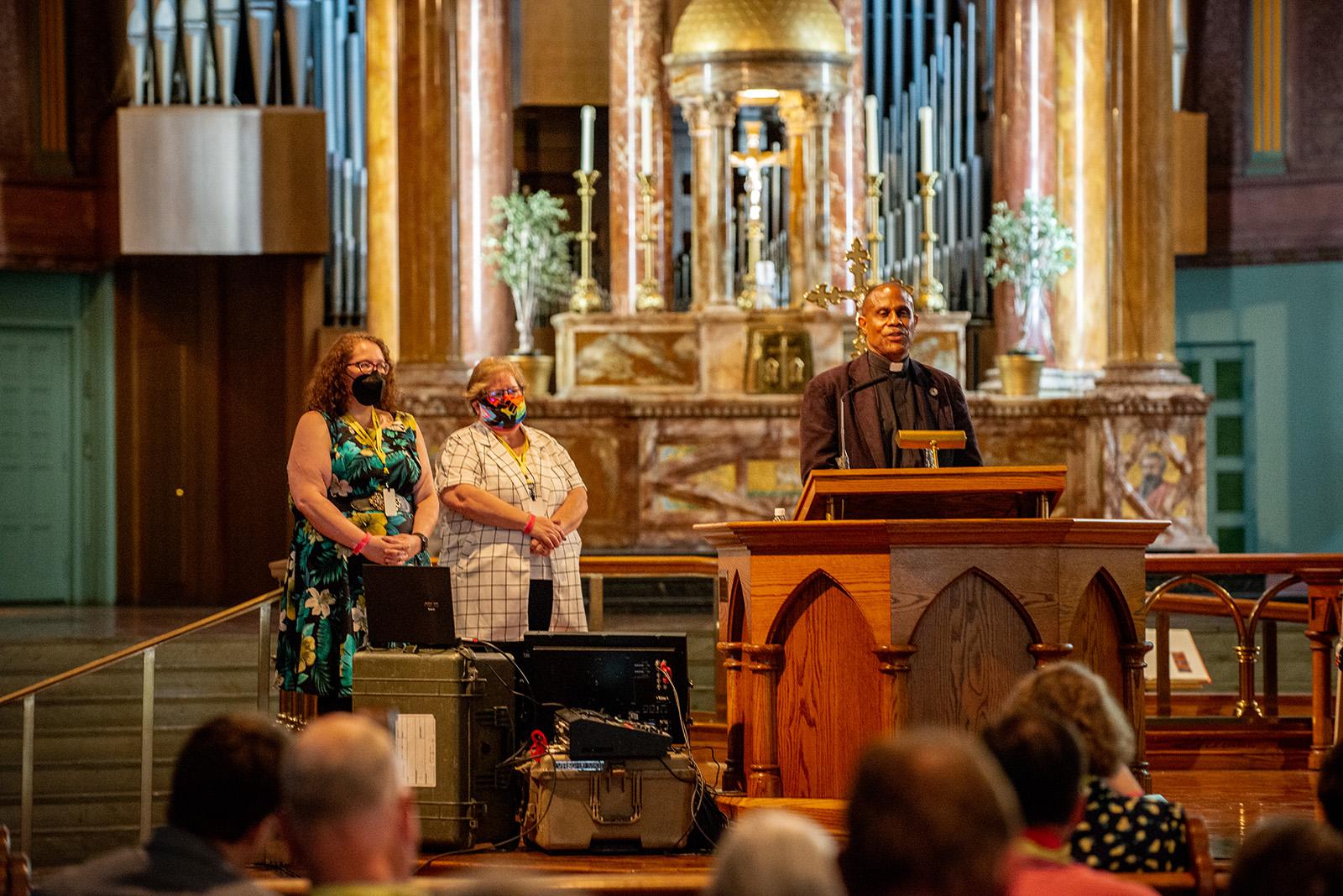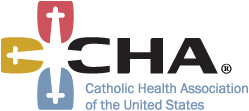Editor’s note: This is the first part of a keynote address delivered by the Rev. Bryan N. Massingale at the Church of St. Paul the Apostle in New York on June 25, 2022. The full address, part of the Outreach LGBTQ Catholic ministry conference, is available here. This version has been edited for length and clarity.
Intersectionality and LGBT Ministry
It is a joy to be with you. It’s a joy to be with you in person. It’s amazing that one of the most common refrains so far has been walking up to people and saying: “This is what you look like. I’ve seen your work; I’ve seen you on Zoom screens.” It’s so good for us to be here. Turn to someone and say: “It’s good for us to be here.”
It is so good for us to be here as we celebrate the common ministry, the sacred work that we are all doing. And sometimes when we do this sacred work, we can feel so isolated and alone. And the joy is present in this room when we look around and we see that there are other really wonderful, cool, holy people doing this work and we’re doing it together. We gather to celebrate our pride. We gather to celebrate our journey into full acceptance of ourselves as God’s beloved creations.
Turn one another and say: “You are God’s beloved.” You are God’s beloved. For so many of us, this is a hard one truth, one that we struggle to believe and to affirm no matter how true, intellectually, we may know that it is. And so it is good for us to be here.
We need to be here to come together, especially in these unsettled, disturbing and even tragic times. I want to thank my good friend, Father James Martin, for the invitation to be here. You told me that the keynotes were supposed to be inspiring and uplifting. And I try to be an obedient priest every once in a while. And I had a different talk in mind, Jim. I really did. But then only a few weeks ago, two events happened that shook me to my core.
The first was in Buffalo, New York, when a young, 18-year-old white man drove hundreds of miles, armed with military weapons, to stalk and to kill as many Black people as he could, simply as they went about their way doing their daily stuff of buying groceries.
He killed them simply because they were Black, because he considered them a danger, a menace to his survival, a menace to the survival of those who looked like him, a menace to those who were white.
The second event happened in Idaho also this very month, when a gang of 31 white men were arrested as they attempted to disrupt a pride celebration sponsored by the North Idaho Pride Alliance.
“To put it bluntly: the ideology of white nationalism sets the context for LGBTQ ministry and gives an urgency to the need for an intersectional awareness and approach to our community.”
These men belong to a white nationalist, white supremacist group called the Patriot Front. According to police reports, they were dressed like a “little army,” bearing shields, skin guards, riot gear and at least one smoke grenade.
They were not intent on peaceful protest. They were there to cause a riot and to inflict bodily harm. They, too, traveled a great distance. Of the 31 arrested, only two were from Idaho. Others came from all over the country, including Michigan and Illinois, Wyoming, and Utah, Washington and Oregon, Virginia and Arkansas. Such was the depth of their hatred, of their contempt for LGBTQ lives, that they drove hundreds of miles to manifest their hate.
What unites both of these groups, and both events and both of these purveyors of evil, was their intersectional hatred and contempt. Too often in LGBTQ circles, we resist talk of race and ethnicity. The most common belief, not so often articulated, is that these are not our issues. We often act as if there are Black spaces and Latino spaces and queer spaces, and never the twain shall meet.
And so, even when we talked about the horrific violence that took place at the Pulse nightclub in Orlando, Florida—one of the worst mass shootings in this nation’s history, one of the most egregious attacks on LGBTQ lives—we seldom, if ever, averted to the fact that these lives were taken in a Latin- themed nightclub. The vast majority of those killed were brown, Latino and Hispanic.
When we bring this up it’s considered divisive. That’s one of the things people say about me when I Google myself. After all, we say we have common struggles, we have common stigmas related to our sexualities and identities. Let’s focus on those common things that we share. The problem is that our enemies, and we do have enemies, don’t believe that they are thinking and acting intersectionally. Even if we sometimes resist seeing the linkage between race, ethnicity and sexuality, our resistance poses a danger to us all. We must be attentive.
To put it bluntly: the ideology of white nationalism sets the context for LGBTQ ministry and gives an urgency to the need for an intersectional awareness and approach to our community.
Now, I realize that this is heavy stuff. So often when we gather to discuss LGBTQ ministry, we focus on our relationship to the institutional church. We talk about bishops’ statements and formulations of church doctrine. And that’s really important work, but it’s also limited. LGBTQ ministry must also attend to the social context in which we live, because that social context impacts our lives, indeed our very survival.
If we’re going to talk honestly about LGBTQ ministry today, we have to understand that it is impossible to minister to us without being aware of the social and cultural moment in which we live our lives.
And so the questions I want to break open for us this morning are these. Can the Catholic Church, Catholic LGBTQ community and our allies hear and answer the cries of the whole community? How can we hear the cries of our diverse community impacted by the realities of racial injustice, gender exclusion and sexual marginalization that stem from our nations and even our churches complicity in white nationalism?
These are the questions that I want to raise with you this morning.
“If we’re going to talk honestly about LGBTQ ministry today, we have to understand that it is impossible to minister to us without being aware of the social and cultural moment in which we live our lives.”
First, I’m going to talk about intersectionality in the process of coming out. And don’t worry, it won’t be too academic. I’ll make this personal. Then I will examine white nationalism and what it has to do with LGBTQ persons. I will argue that it is a growing edge and a litmus test for commitment to justice and inclusion.
And that will end with the challenge this presents to the Catholic LGBTQ community as it contemplates moving forward. Then we’ll talk about the Ignatian grace that we need, to know and love all as God knows and loves all. That’s the beginning, the middle and the end.
As I said, I belong to the Black wing of the Catholic church. We may depart from the outline. That means we’re going to have a Pentecostal moment. We’re going to let the Holy Spirit do what the Holy Spirit wants to do, but then we’ll become good Catholics again and follow the book.
I come to this conversation as a Black, gay priest and theologian. I’m informed not only by my sexuality, my faith and my study of the church’s ethical traditions, but also by the traditions of Black freedom struggles in the United States. I embody the complexity, or better said, the beautiful multiplicity and diversity of LGBTQ identities.
Intersectionality is a word that’s often heard today, and happily, it’s being used to frame our understanding of LGBTQ reality and how we describe our community. For example, GLAAD, one of the foremost LGBTQ human rights groups, declares that there is no pride if it’s not also intersectional. This is an awareness that came to the forefront of our community, especially after the 2020 murders of George Floyd, Ahmaud Arbery and Breonna Taylor, among too many others.
While I could offer an academic definition, intersectionality is simply another way of saying we need to look at, appreciate, celebrate and understand the whole person, that while our community is united by sharing sexualities and gender expressions that differ from the majority, our experiences are also shaped and influenced by other factors that make up who we are.
These factors include race, nationality, national origin, immigration status, disability, gender expression and age, to give a non-exhaustive list. All of these are important, but today I will focus upon how race and ethnicity shape the experience of LGBTQ persons of color and how this has an impact for Catholic LGBTQ justice advocacy.
The second part of this speech will be published tomorrow.




